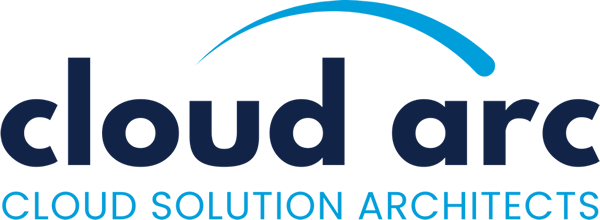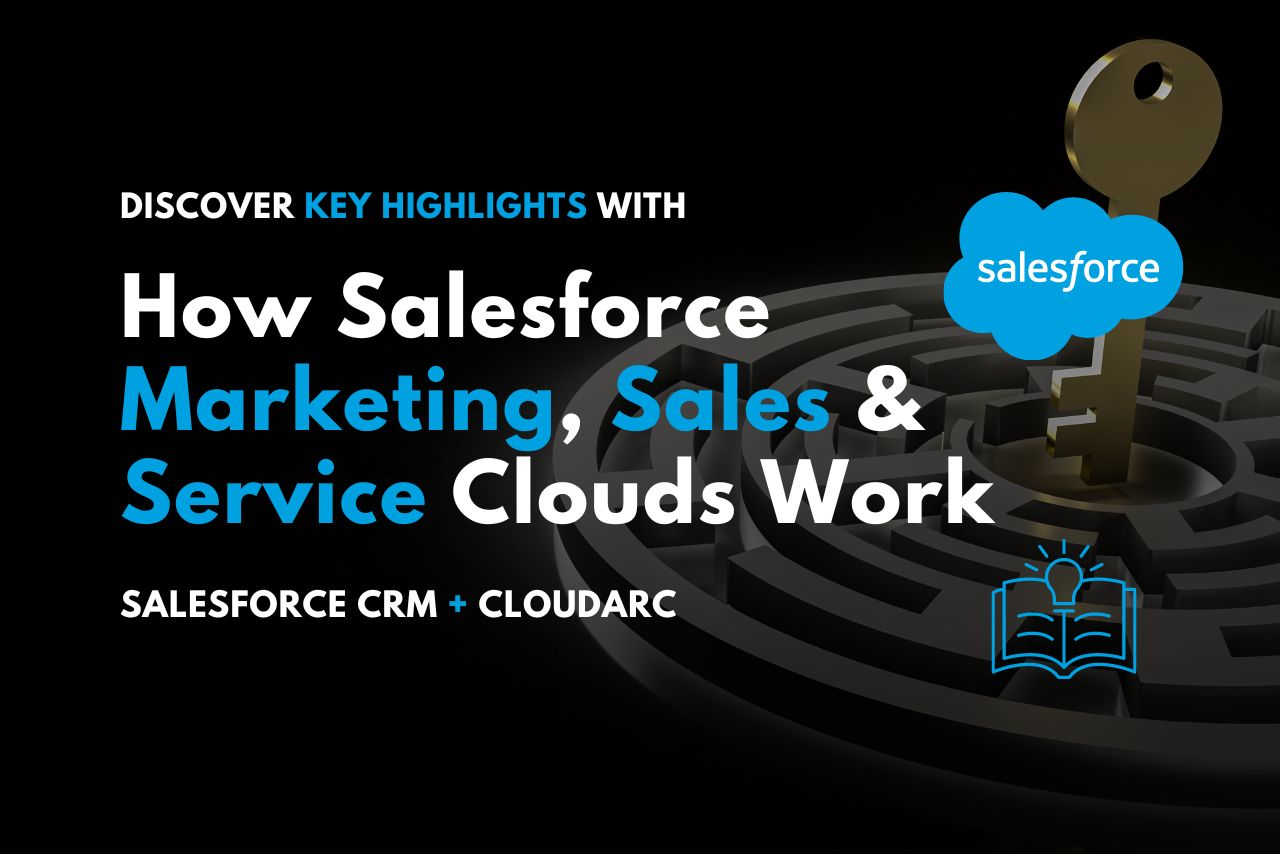Discover Key Highlights How Salesforce Marketing, Sales & Service Clouds Work
Salesforce CRM + CloudArc
Search Tags: salesforce marketing cloud, salesforce service cloud, salesforce sales cloudCloudArc, A Salesforce Partner since 2010.
Key Highlights For Salesforce Marketing Cloud, Sales Cloud & Service Cloud
There’s a lot of hype about different customer relationship management (CRM) systems and what the advantages, value, and strengths of each are. In this article, we will take a closer look at key highlights of how Salesforce Marketing, Sales Cloud, and Service Cloud work to promote positive outcomes for customers. Many people have heard of Salesforce but aren’t familiar with the breadth of functionality available in the different license offerings.Salesforce Sales Cloud
Most well-known of the Salesforce license offerings is Salesforce Sales Cloud. Sales Cloud has been around for more than 20 years. Businesses around the world use it to manage their sales and inventory activities. A closer look at Sales Cloud helps potential users understand how Salesforce Sales Cloud is different from other CRM offerings.
In particular, Salesforce Sales Cloud is a recognized leader in helping businesses manage their leads, opportunities, sales collaborations, and sales forecasts, all while providing functionality not only for laptop and desktop users but also from mobile devices.
More specifically, Salesforce Sales Cloud users are able to effectively manage and oversee their new business leads starting with processes, objects, and fields to capture leads and then qualify them. As a result, businesses are able to manage leads effectively to ensure those leads are routed to the most appropriate sales representatives for suitable follow up.
- Opportunity management is a key function for businesses across industries. Whether your business is in the construction, medical, or technology space, closely monitoring opportunities is essential. With Salesforce Sales Cloud, users are able to effectively manage their opportunities by enabling sales teams to track and manage sales opportunities through the entire sales pipeline. This can begin with sales prospecting and conclude with deal closure. At each step of the process, Salesforce Sales Cloud is a highly functional tool to help businesses meet their goals with respect to opportunity management.
- Collaboration across sales teams is an incredibly valuable function in Salesforce Sales Cloud that empowers team members to be more effective and drive positive outcomes. Features such as Chatter and sharing and assignment of activities and tasks enable sales representatives to communicate about sales opportunities and collaborate on steps to accomplish sales objectives. Using these features, Salesforce Sales Cloud users share information and collaborate real time about new business development opportunities.
- Reporting and dashboard features are functionality for which Salesforce Sales Cloud is well-known and recognized in the sales and business world. Using Sales Cloud reports and dashboards, businesses are able to effectively provide sales forecasts to predict future sales performance, spot trends, and use data to inform decision making.
The power of Salesforce Sales Cloud functionality is exponentially enhanced for users via the Salesforce mobile app. With it, users can manage and oversee leads and opportunities, collaborate across sales teams and with management, as well as use reports and dashboards to track sales forecasting and other key performance indicators. For sales reps or managers in the field, having access to this data real-time from their mobile device can help inform decisions and optimize engagements and deal-making with customers.
Salesforce Service Cloud
Equally as powerful as Sales Cloud, Salesforce Service Cloud enables businesses and nonprofits to effectively provide services to customers. Key features of Salesforce Service Cloud include case management, Salesforce Knowledge, Omni-Channel support, Service Console, and AI-powered insights.
- Using various channels that are optimized for each customer, Salesforce Service Cloud provides those customers with targeted case management. Salesforce Service Cloud captures customer inquiries and routes them to appropriate agents and tracks their resolution.
- Also available for Salesforce Service Cloud users is Salesforce Knowledge that provides businesses and service providers with the ability to build a comprehensive Knowledge Base (KB) inside of Salesforce. These KBs are collections of articles about users’ products or services. These KBs encourage customers of Service Cloud users to resolve their own queries by providing them access to relevant information that support their locating information for which they are searching about certain services or products provided by Service Cloud users.
- Providing customers a seamless experience is a goal for Salesforce Service Cloud users. With Service Cloud, businesses are able to provide support across multiple channels that include phone, email, chat, social media, as well as self-service portals. This Omnichannel support functionality helps Service Cloud users achieve optimized customer experiences.
In addition to providing customers with a seamless experience, it’s beneficial for Service Cloud licensees to make agent experiences unified and seamless. Providing agents with Service Console promotes consistent and efficient resolution of customer cases while uniformly training service agents. Service Console enables agents to effectively resolve customer cases by providing those agents with all the relevant information and tools in one location to support rapid deployment of solutions for customers.
Finally, artificial intelligence (AI) -powered insights in Salesforce Service Cloud are also useful tools to promote user efficiencies. Examples of AI-powered insights in Service Cloud include Einstein Bots and Einstein Case Classification. Functionalities enabled with these types of AI-powered offerings in Salesforce Sales Cloud help customers to automate routine tasks, prioritize cases, as well as provide “intelligent” recommendations to agents. Utilizing these functionalities, Service Cloud users are able to optimize their efficiency and their customers’ satisfaction.
Salesforce Marketing Cloud
Salesforce Marketing Cloud is also widely used by businesses to promote efficiency and optimize revenue. Features such as multi-channel marketing, personalization and segmentation, Salesforce Journey Builder, analytics and reporting, and social media management promote effective marketing practices and business outcomes for Salesforce Marketing Cloud users.
Depending on industry and customer preferences, various channels are more optimized for marketing campaigns. With Salesforce Marketing Cloud, users are able to engage with customers across channels and target marketing campaigns using the most effective channel recognized for their industry segment or vertical. Email, social media, mobile, web, and advertising platforms are all available platforms for which Salesforce Marketing Cloud may be used to promote businesses’ marketing campaigns.
Another attractive feature of Salesforce Marketing Cloud is the ability to personalize and segment marketing campaigns. Leveraging customer data, Salesforce Marketing Cloud users are able to tailor content, offers, and messaging to campaign targets based on the individual preferences and behaviors of those targets.
Utilization of Salesforce Journey Builder is another way Marketing Cloud is demonstrably unique from other CRMs. With Journey Builder, Salesforce Marketing Cloud users are able to design and automate customer journeys that guide customers on their path with a brand or product. Salesforce Marketing Cloud users’ implementation of Journey Builder helps them successfully execute simple or multistep marketing and data management activities. These activities can be implemented on a scheduled basis or driven by triggers specified by Marketing Cloud users in their specific Salesforce orgs.
As with other Salesforce offerings, the data analytics and reporting tools in Marketing Cloud are robust and powerful. Salesforce Marketing Cloud provides analytics tools to support users’ tracking of marketing campaign performance. Users are able to measure their return on investment as well as gain insights into customer behavior and engagement.

he key highlights described above provide an overview of what’s unique about Salesforce Sales Cloud, Service Cloud and Marketing Cloud
If you would like to learn more about how Salesforce may be a useful addition to your business’s suite of software tools, contact us or join one of our webinars and subscribe to our YouTube channel.Looking for a Salesforce Developer? We can help!


